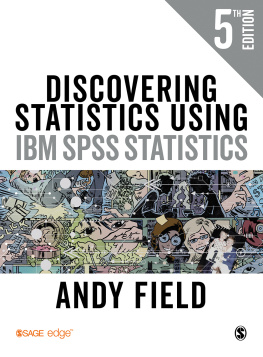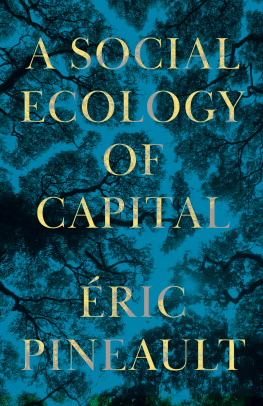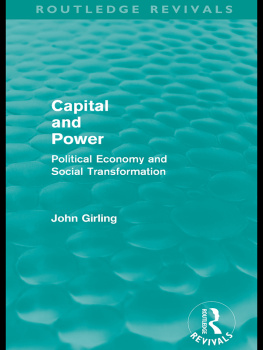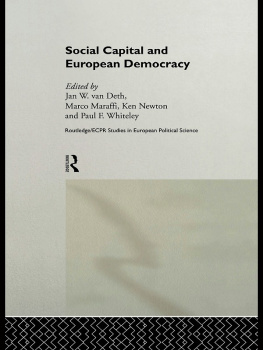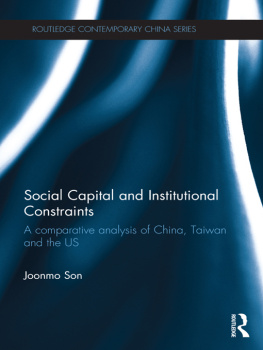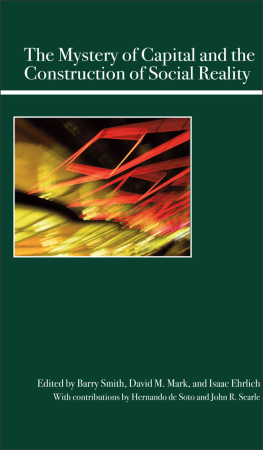Field - Social Capital
Here you can read online Field - Social Capital full text of the book (entire story) in english for free. Download pdf and epub, get meaning, cover and reviews about this ebook. City: London, year: 2010;2008, publisher: Taylor & Francis;Routledge, genre: Politics. Description of the work, (preface) as well as reviews are available. Best literature library LitArk.com created for fans of good reading and offers a wide selection of genres:
Romance novel
Science fiction
Adventure
Detective
Science
History
Home and family
Prose
Art
Politics
Computer
Non-fiction
Religion
Business
Children
Humor
Choose a favorite category and find really read worthwhile books. Enjoy immersion in the world of imagination, feel the emotions of the characters or learn something new for yourself, make an fascinating discovery.
Social Capital: summary, description and annotation
We offer to read an annotation, description, summary or preface (depends on what the author of the book "Social Capital" wrote himself). If you haven't found the necessary information about the book — write in the comments, we will try to find it.
Field: author's other books
Who wrote Social Capital? Find out the surname, the name of the author of the book and a list of all author's works by series.
Social Capital — read online for free the complete book (whole text) full work
Below is the text of the book, divided by pages. System saving the place of the last page read, allows you to conveniently read the book "Social Capital" online for free, without having to search again every time where you left off. Put a bookmark, and you can go to the page where you finished reading at any time.
Font size:
Interval:
Bookmark:
SOCIAL CAPITAL
The term social capital is a way of defining the intangible resources of community, shared values and trust upon which we draw in daily life. It has achieved considerable international currency across the social sciences through the very different work of Pierre Bourdieu in France and James Coleman and Robert Putnam in the United States, and has been widely taken up within politics and sociology as an explanation for the decline in social cohesion and community values in Western societies. It has also been adopted by policy-makers, particularly in international governmental bodies such as the World Bank.
This fully revised second edition of Social Capital provides a thorough overview of the intense and fast-moving debate surrounding this subject. This clear and comprehensive introduction explains the theoretical underpinning of the subject, the empirical work that has been done to explore its operation, and the influence it has had on public policy and practice. It includes guides to further reading and a list of the most important websites.
John Field is a Professor in the Institute of Education, University of Stirling, where he served until recently as Pro Vice-Chancellor for Research. He has published widely on socio-economic aspects of lifelong learning, including previous specialist studies of social capital and adult learning. He is Honorary Professor of Continuing Education at Birkbeck College, University of London.
SERIES EDITOR: PETER HAMILTON, THE OPEN UNIVERSITY, MILTON KEYNES
Designed to compliment the successful Key Sociologists, this series covers the main concepts, issues, debates and controversies in sociology and the social sciences. The series aims to provide authoritative essays on central topics of social science, such as community, power, work, sexuality, inequality, benefits and ideology, class, family and so on. The books adopt a strong individual line, as critical essays rather than as literature surveys, offering lively and original treatments of their subject matter. The books will be useful to students and teachers of sociology, political science, economics, psychology, philosophy and geography.
Citizenship
Keith Faulks
Class
Stephen Edgell
Community
Gerard Delanty
Consumption
Robert Bocock
Globalization second edition
Malcolm Waters
Lifestyle
David Chaney
Mass Media
Pierre Sorlin
Moral Panics
Kenneth Thompson
Old Age
John Vincent
Postmodernity
Barry Smart
Racism second edition
Robert Miles and Malcolm Brown
Risk
Deborah Lupton
Sexuality second edition
Jeffrey Weeks
Social Capital second edition
John Field
Transgression
Chris Jenks
The Virtual
Rob Shields
Social Identity second edition
Richard Jenkins
Culture second edition
Chris Jenks
Human Rights
Anthony Woodiwiss
Childhoodsecond edition
Chris Jenks
Cosmopolitanism
Robert Fine
Second Edition
John Field

LONDAN AND NEW YORK
First published 2008 by Routledge
2 Park Square, Milton Park, Abingdon, Oxon, OX14 4RN
Simultaneously published in the USA and Canada
by Routledge
270 Madison Avenue, New York, NY 10016
Routledge is an imprint of the Taylor & Francis Group, an informa buisness
This edition published in the Taylor & Francis e-Library, 2007.
To purchase your own copy of this or any of Taylor & Francis or Routledges collection of thousands of eBooks please go to www.eBookstore.tandf.co.uk.
2008 John Field
All rights reserved. No part of this book may be reprinted or reproduced or utilised in any form or by any electronic, mechanical, or other means, now known or hereafter invented, including photocopying and recording, or in any information storage or retrieval system, without permission in writing from the publishers.
British Library Cataloguing in Publication Data
A catalogue record for this book is available from the British Library
Library of Congress Cataloging in Publication Data
Field, John.
Social capital / John Field. 2nd ed.
p. cm.
Includes bibliographical references.
ISBN 9780415433020 (hard cover) ISBN 9780415433037 (paper cover) ISBN 9780-203930519 (electronic) 1. Social capital (Sociology) I. Title.
HM708.F54 2008
302dc22
2007043002
ISBN13: 978-1-134-08151-6 ePub ISBN
ISBN10: 0-415-43302-9 (hbk)
ISBN10: 0-415-43303-7 (pbk)
ISBN10: 0-203-93051-7 (ebk)
ISBN13: 978-0-415-43302-0 (hbk)
ISBN13: 978-0-415-43303-7 (pbk)
ISBN13: 978-0-203-93051-9 (ebk)
Connections count, and many friends, colleagues and acquaintances have helped me develop my ideas about social capital. Much of this learning has been profoundly rewarding in itself. Trust and reciprocity are not just conceptual abstractions; they help make life rather more secure and pleasurable than it would otherwise have been. Equally, of course, at some stages in life I have found myself learning lessons about trust, reciprocity and loss that I could well have lived without. Many of us discover at some stage that while our closest and most valued ties often lend meaning and affirmation to our existence, for that very reason they can also prove to be the cause of deep pain. Such everyday lessons positive and negative are writ large in our wider society, and you may want to reflect on your own personal ties with individuals and groups as you read your way through this book, just as I did when writing it.
Writing this book has benefited from countless exchanges with friends and colleagues, providing me with very particular examples of the ways that our connections are resources. The second edition has benefited from readers comments on the first edition; Robert Putnam was characteristically constructive and generous in his suggestions; my colleagues Grant Jarvie, Muir Houston and Richard Edwards drew my attention to new literature that I would otherwise have missed; Tom Schuller sent good tidings about a paper on earnings and bars (boozehounds will find it cited in Chapter2), and Jaswinder Dhillon shared interesting and important questions about social capital, education and ethnicity, which she plans to explore further in her own research. Martyn Turner, a man as courageous as he is funny, gave permission for me to use one of his cartoons.
I am also most grateful to all those many organisations university departments, voluntary associations, campaigning groups, community development agencies, business networks and policy agencies who wanted to discuss social capital with me as a result of the first edition, and whose generally lively audiences were free with ideas and suggestions about this exciting and complex concept.
I have also benefited from thoughtful and sometimes sharply critical conversations with Peter Alheit, Julie Allan, Loraine Blaxter, Jaswinder Dhillon, Kathryn Ecclestone, Richard Edwards, Ian Falk, Tom Healy, Sue Kilpatrick, William Maloney, Sian Reynolds, Michael Strain, Lorna Unwin and Bill Williamson. From Gudrun Geirsdottir I gleaned a fine Icelandic proverb. Pat Ainley, Christina Hughes and Tom Steele tried to persuade me that social capital is a dead-end or worse; they failed but I learned in the process. John Scott read the draft of the first edition and provided valuable feedback. Above all, I owe an enormous amount to three colleagues Steve Baron, Tom Schuller and Simon Szreter with whom I worked on the remarkably enjoyable seminar series on social capital sponsored by the Economic and Social Research Council, which ran during 2000 and 2001 in Cambridge, Glasgow, London and Warwick. These seminars built social capital as well as debating it, and I have lost track of the debts which I owe to the participants. Tom and Steve are not only good chums but were also wonderful co-editors of a book of critical essays on social capital.
Font size:
Interval:
Bookmark:
Similar books «Social Capital»
Look at similar books to Social Capital. We have selected literature similar in name and meaning in the hope of providing readers with more options to find new, interesting, not yet read works.
Discussion, reviews of the book Social Capital and just readers' own opinions. Leave your comments, write what you think about the work, its meaning or the main characters. Specify what exactly you liked and what you didn't like, and why you think so.


